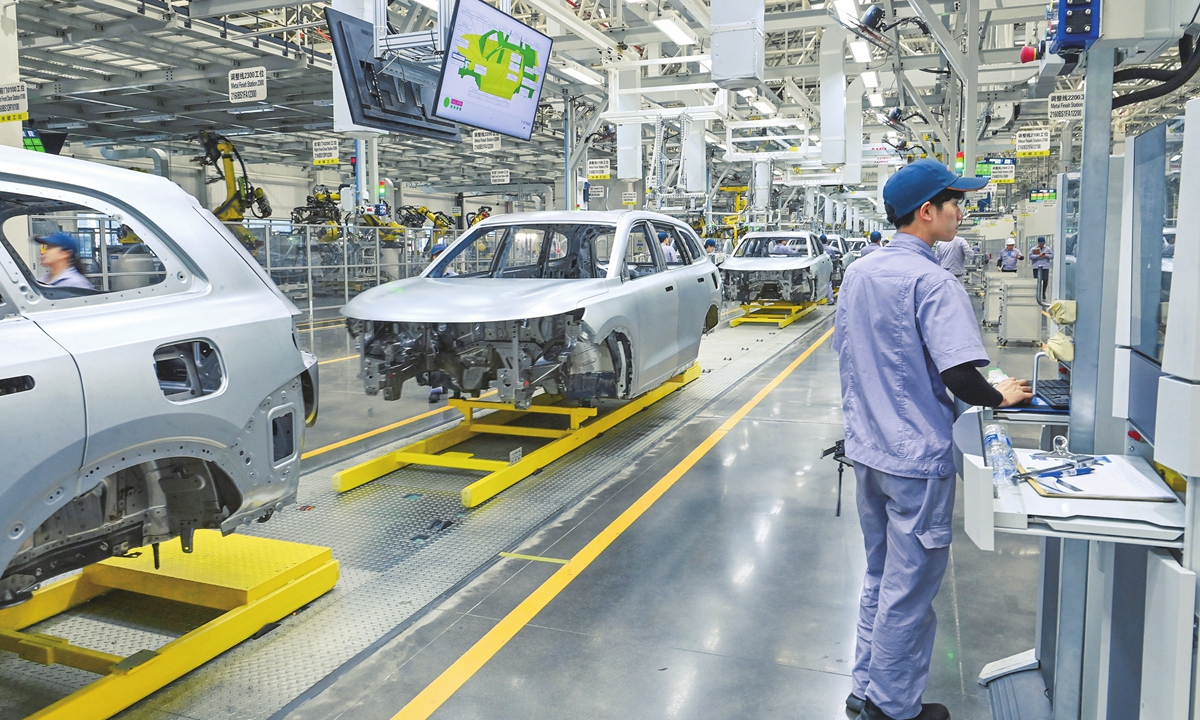
The manufacturing line of a NEV factory in Southwest China's Chongqing Municipality Photo: VCG
Sales of China's new-energy vehicles (NEVs) in June as well as the first half of 2024 continued to extend their strong momentum, with major domestic manufacturers reporting a significant growth in yearly increase, according to data newly released by multiple Chinese NEV enterprises.
Observers attributed the booming growth to strong government backing, growing competitiveness and continuously improving facilities. They also refuted the "overcapacity" narrative, noting that practices implemented by the West targeting Chinese NEVs will only damage global cooperation while ultimately backfiring on their own development.
From January to June this year, BYD sold 1.61 million NEVs, recording a year-on-year increase of 28.46 percent. The company sold 341,658 units of NEVs in June alone, up from 253,046 compared with the same period in 2023, the company said in a filing on Monday.
Chery's NEV sales in the first six months totaled 180,947, recording an annual growth of 181.5 percent, while the company's total sales of vehicles surpassed 1 million for the first time to reach 1.1 million, according to Chery's official WeChat account.
Supportive measures such as the consumer goods trade-in program have spurred sales of NEVs, while the new models equipped with high technologies have stimulated consumption interest, Zhang Xiang, director of the Digital Automotive International Cooperation Research Center of the World Digital Economy Forum, told the Global Times on Tuesday.
The surge in sales was also bolstered by the enhanced competitiveness of domestic NEVs with elevated battery lives and lower selling prices, while charging and switching infrastructure has become more advanced, said Wu Shuocheng, a veteran automobile industry analyst.
Meanwhile, emerging Chinese NEV manufacturers also continued their momentum during the above-mentioned period.
Li Auto delivered a total of 822,345 units of NEVs as of Sunday, ranking first among emerging domestic players. Meanwhile, NIO delivered 87,426 vehicles in the January-June period.
Chinese carmaker Seres recorded a yearly increase of 348.55 percent in NEV sales to 200,949 in the first six months of the year, while its June's car sales jumped 372.04 percent year-on-year to 44,126, the company said on Monday.
Automaker XPeng delivered 52,028 new vehicles in the first half of the year with a yearly increase of 25.57 percent, and deliveries from Leapmotor in June exceeded 20,000 for the first time to 20,116.
Amid China's continuing development in the NEV sector, global players have been stepping up cooperation with Chinese companies despite increasingly protectionist moves against the Chinese EV sector implemented by the US and the EU.
US carmaker Tesla in June exported 71,007 vehicles made in China, according to data released by the China Passenger Car Association on Tuesday.
Germany's Volkswagen Group and China's SAIC Motor will further expand their presence in the EV market, with the two carmakers signing several energy technology cooperation agreements in June. Under the agreements, both sides will jointly develop three plug-in hybrid models and two pure electric models in China and launch them as soon as 2026.
Analysts noted that the capacity utilization of China's NEV sector is about 80 percent, while the figure for some large NEV enterprises has topped 100 percent, discrediting the claims of "overcapacity."
In the long term, protectionism will only jeopardize the West's own competitiveness, while the rise of China's EVs is the result of openness, competition and cooperation, Wu told the Global Times on Tuesday.
The EU's planned tariff hikes will burden European consumers as they will have to pay a higher price, Zhang said, adding that the West's use of "overcapacity" as an excuse to suppress Chinese NEVs will only create obstacles to their own industrial upgrading.
Zhang noted that the US and the EU have also politicized normal international trade in a bid to crack down on China's NEV sector, fearing that the technological gap with China in the sector will further broaden.
China's Commerce Ministry said last week that working teams of the two sides have maintained close communication and are accelerating talks, agreeing to launch consultations on EU's anti-subsidy investigations into Chinese EVs.




